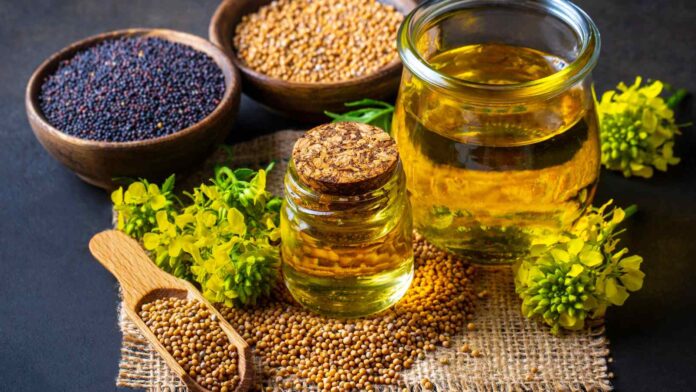Indian cuisine, known for its vibrant flavors and aromatic spices, relies heavily on various oils and ingredients to create its distinctive taste. Among the essential elements of an Indian kitchen is mustard oil, celebrated for its pungent aroma and sharp flavor. A staple in many Indian households, mustard oil is used both in its raw and cooked form to enhance the taste and texture of dishes. However, while it remains a beloved ingredient in India, it is banned in the US and several other countries due to concerns regarding its safety for human consumption. This has raised questions about the nature of mustard oil, its benefits, and the risks associated with its consumption.

Why is Mustard Oil Banned in the US?
The primary reason for the ban on mustard oil in the United States and other countries, such as Canada and many European nations, stems from its high content of erucic acid. Erucic acid is a type of omega-9 fatty acid, which is commonly found in mustard oil, as well as in other oils like rapeseed oil and wallflower seed oil. While erucic acid has its uses, excessive consumption poses significant health risks.
The U.S. Food and Drug Administration (FDA) has flagged the presence of high levels of erucic acid in oil as a concern for health. Studies suggest that this fatty acid is not easily metabolized by the human body, which can lead to its accumulation and various adverse effects. The most concerning health risks associated with erucic acid include cardiotoxicity, liver damage, growth retardation, reproductive health issues, and potential carcinogenicity.
Health Risks of Erucic Acid in Mustard Oil
1. Cardiotoxicity: One of the most severe concerns regarding erucic acid is its potential to cause myocardial lipidosis, a condition where fat accumulates in the heart muscle cells. This accumulation can impair the normal function of the heart, leading to weakened heart performance, and, in extreme cases, could result in heart disease. Individuals with existing heart conditions are particularly vulnerable to this risk.
2. Liver Damage: Excessive consumption of erucic acid has been linked to liver enlargement and the development of fatty liver disease. This condition hampers the liver’s ability to function properly, disrupting metabolic processes and increasing the risk of liver disease. Prolonged exposure to high levels of erucic acid can exacerbate these effects.
3. Growth Retardation: Animal studies have indicated that high levels of erucic acid intake can result in growth retardationand reduced weight gain. While more research is needed to fully understand the implications for humans, there are concerns that children and adolescents could be particularly vulnerable to these effects.
4. Reproductive Health Issues: Some studies have pointed to the possibility that erucic acid may negatively impact reproductive health. Although the data is primarily based on animal research, it raises concerns about potential risks to human reproductive systems. Further studies are needed to confirm the extent of these effects in humans.
5. Gastrointestinal Distress: Mustard oil’s strong, pungent flavor can also cause digestive issues in some individuals. Consuming large quantities of mustard oil may result in stomach cramps, diarrhea, and nausea. For individuals with sensitive stomachs, oil’s intensity can be overwhelming and disruptive to the digestive system.
6. Potential Carcinogenicity: Although there is no conclusive proof, some studies have raised concerns about the carcinogenic potential of long-term consumption of high levels of erucic acid. More research is needed to establish any direct link between erucic acid and cancer, but the suspicion alone has contributed to the bans in countries like the US.
Given the potential health risks associated with mustard oil, countries like the USA, Canada, and the European Union have taken action by banning its sale for human consumption. However, efforts are underway to address these concerns. In fact, researchers in Canada developed a low-erucic acid cultivar of rapeseed in the 1950s, which led to the creation of canola oil. Canola oil has since become a popular alternative to mustard oil due to its similar properties and significantly lower erucic acid content.

The FDA has approved one brand of edible mustard seed oil that is produced from a cultivar bred specifically for its low erucic acid levels. This demonstrates that solutions are being explored to make mustard oil safer for consumption without completely eliminating its use.
While mustard oil is banned in many countries due to health concerns, it remains a common ingredient in Indian households and is deeply ingrained in Indian cooking traditions. It’s important to note that many of these health risks are associated with excessive consumption of mustard oil. For most people, using oil in moderation as part of a balanced diet should not pose significant risks.
For those who continue to use mustard oil, there are several steps they can take to ensure their health and safety:
1. Read the Labels Carefully: Consumers should opt for processed oil that has undergone low-erucic acid treatment. These versions are safer for human consumption and are increasingly available in the market.
2. Source from Reputable Brands: When purchasing mustard oil, it’s essential to invest in reputable brands that ensure the freshness and quality of their product. This helps reduce the risks associated with low-quality or improperly processed oil.
3. Consume in Moderation: As with any oil or ingredient, it’s crucial to use mustard oil in moderation. A balanced diet that incorporates a variety of cooking oils is beneficial for overall health.
Mustard oil, with its rich aroma and distinctive taste, remains a beloved ingredient in Indian cuisine. However, its high erucic acid content has led to its ban in several countries due to potential health risks. The risks associated with mustard oil include cardiotoxicity, liver damage, reproductive issues, and digestive distress, among others. Fortunately, research and development efforts are being made to reduce the erucic acid levels in mustard oil, making it safer for consumption. For now, moderation is key, and consumers should be mindful of the quality of mustard oil they use. Despite the controversy surrounding its safety, mustard oil continues to play an essential role in kitchens across India, enhancing the flavors of countless traditional dishes.


